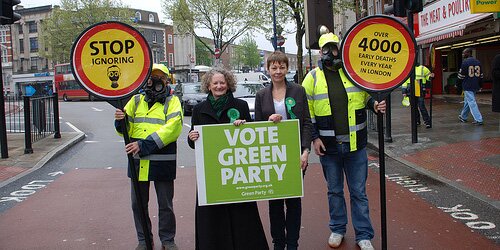Remembering Suffragette Emily Wilding Davison a 100 yrs on: why we need a campaign
10:12 am - November 15th 2012
| Tweet | Share on Tumblr |
by Elly Badcock
The 2013 Epsom Derby marks 100 years since Suffragette Emily Wilding Davison was killed under the King’s Horse.
Acting on the slogan ‘Deeds not Words’, Emily made the ultimate sacrifice. She leapt in front of Anmer, the horse belonging to King George V.
This was an act which placed the Suffragette cause firmly in the public eye. She brought attention to the Government’s contemptuous refusal to treat the movement seriously, the disgraceful torture the Suffragettes faced in prison, and she couldn’t be ignored.
Although the press were predictably derogatory about her protest – the Morning Post called it a ‘mad act’ and focused heavily on the fate of the horse and jockey – there can be no question that Emily’s willingness to sacrifice her life for the vote brought home the importance of the cause to a new generation of women.
Emily was amongst the most militant of the Suffragettes, and their mass protests and civil disobedience were instrumental in bringing the vote to women across the UK. But she never lived to see the change she helped engender; she died from her injuries two days after her heroic act.
Every time we stand at a ballot box today, we should be reminded that it took women fighting, marching, and dying for us to cast our vote.
The road to the ballot box is lined with the force-feeding tubes that imprisoned Suffragettes faced at Holloway Prison, and the daily abuse they faced for their struggle; it’s littered with social exclusion, pain, and the bodies of women like Emily, who sacrificed their lives for our freedoms.
Of course, the struggle for women’s liberation cannot end at the ballot box either. We have many battles left to face; but it is women like Emily who showed us we are strong enough to fight them.
For that reason, the Emily Wilding Davison memorial campaign has been formed. We are calling for a minute’s silence at next year’s Derby, to commemorate 100 years since Emily’s courageous actions.
The campaign has already gained support from a huge variety of public figures; from Jeanette Winterson, author of Oranges Are Not the Only Fruit, to Frances O’Grady, newly elected head of the Trade Union Congress.
You can join them in signing and sharing the petition here.
The campaign launch will be on November 29th, 6.30pm at Firebox. We’ll hear from Christine Blower of the National Union of Teachers as well as the relatives of Suffragettes Sylvia Pankhurst and Alice Hawkins. Please join us on the day, and help us remember this brave Suffragette.
| Tweet | Share on Tumblr |  |
This is a guest post.
· Other posts by Guest
Story Filed Under: Blog ,Equality ,Feminism
Sorry, the comment form is closed at this time.
Reader comments
Lol. Dear Liberal Conspiracy, I didnt notice ANY editorial on here as equality was rolled back for women, in fact Sunny was fairly clear that those cuts, like cuts to local authorities, welfare cuts, cuts to social care, cuts to childrens services were ok cos they were Labour cuts too.
A minute’s silence sounds like a good idea. Actually, seems odd that a campaign is necessary – would the organisers not just do it if asked?
The first link doesn’t work, btw.
Deeds not words are what are required today.
It would be a fitting tribute to Emily Wilding Davison if we could all do something to recover the democracy that Parliament has stolen from us all – men and women.
It is impossible to find words to adequately describe the self-serving pond life who so treacherously rule us.
“the disgraceful torture the Suffragettes faced in prison”
Eh? Had the rack out for them, did they?
“lined with the force-feeding tubes”
You mean that as torture? Keeping people on hunger strike alive?
Dear oh dear. How does one comment on these kind of articles without sounding like a total troll?
From my first rading of this, something just didn’t sit right. A minute’s silence? First of all we are being forced to indure far too many minutes of silence all the time now.
Secondly, it’s almost ancient history, and votes for women would have come anyway. There was no need for people to be hurling themselves under horses. We are always evolving as a society, and things will change.
I always suspect the people who spot trends early these days and throw themselves into campaigning for them and like to denounce the rest of society which is more dozy and not so alert and up to speed.
It’s almost like a way of showing off about how right-on you are.
Kind of like the way Ben Elton made his career on being the opposite of the old style working class comedians like Bernard Manning. How we loved to take a kick at him. What an old dinasaur.
It’s happened with gay marriage now too.
All those who don’t agree have to be denounced.
What I hope most is though, that it’s OK to just say you disagree, and for people to say ”that’s fair enough” …. rather than saying you’re a ”bigot” etc … which is what sometimes happens on these kinds of blogs.
I wish socialism got half as much exposure on here as feminism. How come you lot get taken so seriously and we are marginalised?
Should we commemorate the Suffragettes or should we re-edit history a bit to render it more palatable?
Try this research, by a feminist historian. After the franchise was extended to all adult citizens in 1928, in time for the 1929 general election, some more-or-less prominent suffragettes were evidently lost for a cause and moved to join the British Union of Fascists following its foundation by Mosley in 1932, which graphically demonstrates the extent of their commitment to democratic practices. Julie Gottlieb names names: Mary Richardson, Norah Elam (Mrs Dacre Fox), and Mary Allen.
“Julie Gottlieb’s Feminine Fascism would disabuse them. Its brilliant analysis of the place of women in Oswald Mosley’s British Union of Fascists does much to change our preconceptions. Where women played comparatively little part in the fascist movements of other European countries, more than 25 per cent of the BUF members were women, many of whom were prominent in the movement’s activities. All this, despite the macho image, so similar to that of continental fascism, displayed by the leader and by so many of his acolytes.”
http://www.timeshighereducation.co.uk/story.asp?storyCode=157840§ioncode=6
OTOH Sylvia Pankhurst went the other way and became a founder of the Communist Party.
@ damon
I agree with some of that, including the bit about having too many minute’s silences these days – but it’s a 100-year anniversary, and she died for a good cause, so I don’t see the harm.
The real problem is when people want to start adding annual silences, because they’d build up fast.
@Chaise Guevara. OK – but I’m not that impressed with our form of democracy. The capitalists always win.
Modern democracy particularly seems to styme political activism and ideas. Sure it was wrong to deny women the vote, but I had a chance to vote for something today (the police I think), and couldn’t be bothered to as it wouldn’t make a blind bit of difference to anything in real life.
My point isn’t that I’m against equality, but I really am not sure what that means always. Men often have worse lives than women. Women often have better jobs than men. I was working yesterday for less than £7 an hour. It’s all men who do that job and it’s hard.
Multi-drop parcel delivery in a van, where you’re expected to do up to seventy drops. It’s just too many. Women chose to leave that to the guys it seems.
@ damon
I think people look to the averages over things like that – Fred might be paid more than Gemma, but men in general get higher pay.
However, that sort of data is often used rather naively – simply adding up men and women’s salaries and dividing by the number of each in work is far away from proving that we have discrimination in play.
I also disagree with the first commenter that equality is “rolled back” if a policy can be shown to disproportionately affect one gender. I suppose you could argue that it’s technically true, but you could do that with almost any policy if you ran enough demographics through the calculator.
” Acting on the slogan ‘Deeds not Words’, Emily made the ultimate sacrifice. She leapt in front of Anmer, the horse belonging to King George V. ”
Strictly speaking she did not actually leap in front of Anmer. She walked onto the course to try and put a Suffragette sash on one of the horses which would be seen by the British elite as the horse finished the race. A misjudgement meant she was fatally struck by the horse. It was probably a pure coincidence that it was the King’s horse. Highly unlikely that she could have picked that specific horse out at that speed or even have known where he was placed in the field of runners. A recording of the incident can be seen around 5.50
http://www.youtube.com/watch?v=wVrlLKAR1S0
Quite an incident packed Derby. The Suffragette died of her injuries. The jockey made a full recovery from his concussion. Anmer was fine but was useless anyway. The winner was disqualified in what was thought to be a political decision because he was owned by the son of the Titanic owner. The promoted winner was subsequently sold to Russia and was thought to have been eaten by the Bolsheviks during the Russian Revolution.
Chaise Guevara, my point was really that discrimination comes in many kinds of ways. To get a job in the clothing store ‘Hollister’ it seems you have to be young and beautiful. I’m sure I’d never even get a sniff of as job there, unless it was sweeping up after the place had closed. Pure discrimination …. but one we don’t make a fuss about.
Just to join the library these days you have to answer questions about your race, religion and sexuality, but a lot of employers still discriminate hugely. And gender can be an asset for many jobs. Lots of businesses want female staff. You only have to see all the bright young things travelling to work on public transport.
The people going to work on the very early morning buses in Leeds, like I mentioned a few weeks ago, don’t resemble the professionals who are to be seen in city centre wine bars in the early evening.
Sure lets have gender equality … but I can’t feel too sorry for a woman in a top paying job, feeling she’s facing some gender discrimination to get to that next promotion. You can be male and your face might not fit either.
They say you even have to have a full head of hair to get elected to high office. How unfair is that?
Equality for baldies I say …..and short people.
@ 12 damon
Agreed. We seem to have a shortlist of forms of discrimination that we bother to deal with. I think there’s a debate to be had about at which point attractiveness becomes a genuine job “skill” for front-line staff – Hooters, for example, could rightly argue that its waiting staff are primarily eye-candy – but my personal experience tells me that the “hire someone pretty to smile at the customers” thing is a lot more common than it should.
I am not exactly sure about this. My understandings was that the militancy of the suffragettes actually harmed their cause. The true heart of the problem was a political stasis in that Lloyd George supported their claims, but his party would not condone the notion since the majority of enfranchised women would actually vote Tory, while the Tory backbenchers supported the notion because of the number of vote they would receive but the leader of the time was dead against it.
The important thing to remember about the early suffragette movement was that it was a movement to *restore* voting rights to women (under the “femme sole” qualification) that had been *removed* by the Great Reform Act. Indeed, there were still women’s names on electoral registers in the early 1900s, which Emmeline Pankhurst used to great media coverage. It was, in the beginning, an essentially “Conservative” campaign in wishing to return to a previous state of affairs; it only became radical when it became obvious the political elite would not restore these “ancient rights”.
@ 14 Al
Hang on, women had the vote before? I didn’t know about this. When was that granted and taken away?
Hi guys,
Just to come back on a few points.
@Chris, I’m not sure where you get that idea from. I’m a socialist myself, and have written about the student movement from a socialist point of view before.
@damon, I don’t understand why you’ve gone off on one about affirmative action and the pay gap; however, it’s a widely accepted fact that low wages, the preponderance of part time work and discrimination in the workplace mean women get paid substantially less on average than men. You talk about doing parcel drops, heavy lifting etc; you forget that many women do jobs like cleaning which are equally physically demanding and carry a much lower status with them. I agree with you, though, that the point of feminism should not be to defend the female CEO: it’s to fight the sticky floor, not smash the glass ceiling.
15
@Chaise
Unmarried (wealthy) women, who were householders, and therefore ratepayers, could vote in local elections from 1869. This was based on the ethos of ‘no representation without taxation’, of course most women were no entitled to vote and certainly no working class women.
Reactions: Twitter, blogs
-
Jason Brickley
Remembering Suffragette Emily Wilding Davison a 100 yrs on: why we need a campaign http://t.co/fQhaEY9T
-
Marie Paludan
Remembering Suffragette Emily Wilding Davison a 100 yrs on: why we need a campaign | Liberal Conspiracy http://t.co/NlSICU8X via @libcon
-
Frothy Dragon
Remembering Suffragette Emily Wilding Davison a 100 yrs on: why we need a campaign | Liberal Conspiracy http://t.co/NlSICU8X via @libcon
-
leftlinks
Liberal Conspiracy – Remembering Suffragette Emily Wilding Davison a 100 yrs on: why we need a… http://t.co/ORqyt8TZ
-
Caroline Kinsella
Remembering Suffragette Emily Wilding Davison a 100 yrs on: why we need a campaign | Liberal Conspiracy http://t.co/mWnsc2PJ via @libcon
-
abbee mclatchie
Remembering Suffragette Emily Wilding Davison a 100 yrs on: why we need a campaign | Liberal Conspiracy http://t.co/mAH2s3R2 via @libcon
Sorry, the comment form is closed at this time.
NEWS ARTICLES ARCHIVE





















